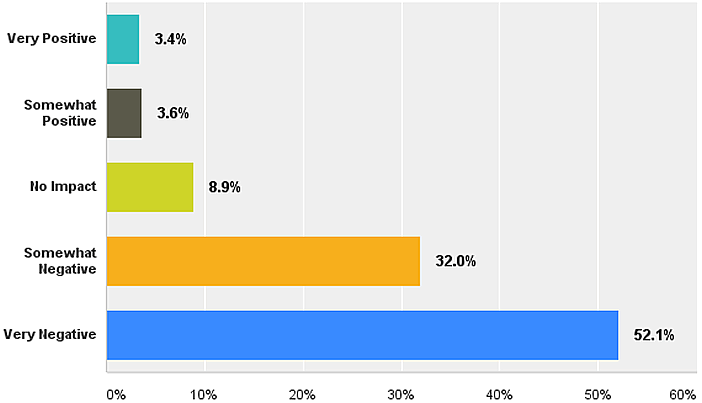According to June LANDTHINK Pulse results, 52.1% of respondents indicated that if the government eliminates the 1031 exchange, it would have a very negative effect on the land market. In late 2014, several proposals to Congress suggested, as one of many means of tax reform, elimination of Section 1031 of the tax code. The 1031 exchange has been a part of the tax code since 1921, and allows owners of a business or investment property to postpone paying capital gains taxes if they reinvest the proceeds from the property sale in a qualifying, like-kind exchange. The 1031 is a powerful economic tool, and the boost it brings to the economy clearly supports its nearly 100-year-old existence.
The June Pulse asked: If the government eliminates 1031 exchanges, what impact will it have on the land market?
Based on a recent survey conducted by The National Association of Realtors®, “63% of Realtors® participated in a like-kind exchange transaction between 2011 and 2015”. Proponents of the section 1031 assert that its use in transactions makes for a more buoyant real estate market. Many investors utilize the 1031 exchange, since the deferral of the capital gain tax gives them significantly more purchasing power and encourages their continual exchange of assets, since they don’t take a big tax hit. Our informal online survey revealed that 52.1% of those responding believed that elimination of the 1031 tax exchange would have a very negative effect on the land market. This was followed by 32% of our audience that thought there would be a somewhat negative effect on the land real estate market. A scant 3.4% thought it would have a very positive effect. Many in the real estate industry, as well as those participating in the Pulse, likely feel that elimination of the 1031 exchange would make sellers reluctant to sell their properties. If the government eliminated the 1031 exchange, a domino effect could spur a downturn in the real estate market as well as a decrease overall economic activity. Fewer transactions would mean fewer jobs in other areas of the economy, mainly in construction and spending that comes after a “like kind” exchange has transpired, but also among all areas related to the real estate industry. Keep in mind the IRS does place restrictions on the use of the 1031 tax exchange. If you are considering a 1031 exchange, always seek legal, tax, and financial advice from licensed professionals before proceeding.
Here are the final results:

- 52.1% said Very Negative Effect
- 32.0% said Somewhat Negative
- 8.9% said No Impact
- 3.6% said Somewhat Positive
- 3.4% said Very Positive
Thank you to everyone who participated and shared the Pulse with friends and connections in the land industry.
LANDTHINK is seeking a sponsor for the August LANDTHINK Pulse and months thereafter. The summer buying season is here! There’s no better time for land industry businesses and professionals to sponsor the Pulse question! Pulse sponsorships are offered on a first come first serve basis and are subject to certain limitations. If your business would be interested in sponsoring next month’s August Pulse question, please contact us soon.
Do you have a suggestion for next month’s Pulse question? Submit your question here and we might choose yours!
If you were to invest in timberland, which would be more important to you: immediate cash flow or capital appreciation? Tell us what you think! Click here to answer the July Pulse question!
This content may not be used or reproduced in any manner whatsoever, in part or in whole, without written permission of LANDTHINK. Use of this content without permission is a violation of federal copyright law. The articles, posts, comments, opinions and information provided by LANDTHINK are for informational and research purposes only and DOES NOT substitute or coincide with the advice of an attorney, accountant, real estate broker or any other licensed real estate professional. LANDTHINK strongly advises visitors and readers to seek their own professional guidance and advice related to buying, investing in or selling real estate.







Add Comment